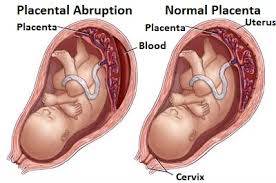NCLEX Placenta Abruption
NCLEX Placenta Abruption
Placenta Abruption Overview
Placental abruption is a complication of pregnancy, wherein the placental lining has separated from the uterus of the mother prior to delivery. It is the most common pathological cause of later pregnancy bleeding. In humans, it refers to the abnormal separation after 20 weeks of gestation and prior to birth. Placental abruption is a significant contributor to maternal mortality worldwide; early and skilled medical intervention is needed to ensure a good outcome, and this is not available in many parts of the world. Treatment depends on how serious the abruption is and how far along the woman is in her pregnancy.
Placental abruption has effects on both the mother and fetus. The effects on the mother depend primarily on the severity of the abruption, while the effects on the fetus depend on both its severity and the gestational age at which it occurs. The heart rate of the fetus can be associated with the severity.
Signs and Symptoms
In the early stages of placental abruption, there may be no symptoms. When symptoms develop, they tend to develop suddenly. Common symptoms include sudden onset abdominal pain, contractions that seem continuous and do not stop, pain in the abdomen and back, vaginal bleeding, enlarged uterus disproportionate to the gestational age of the fetus, decreased fetal movement, and decreased fetal heart rate.
A placental abruption caused by arterial bleeding at the center of the placenta leads to sudden development of severe symptoms and life threatening conditions including fetal heart rate abnormalities, severe maternal hemorrhage, and DIC. Those abruptions caused by venous bleeding at the periphery of the placenta develop more slowly and cause small amounts of bleeding, intrauterine growth restriction, and oligohydraminos.
Classic symptoms of placental abruption include
- Vaginal bleeding
- Abdominal pain
- Back pain
- Uterine tenderness
- Rapid uterine contractions
Causes
The specific cause of placental abruption is often unknown. Possible causes include trauma or injury to the abdomen from an auto accident or fall.
Risk Factors
- Pre-eclampsia
- Chronic hypertension
- Short umbilical cord
- Prolonged rupture of membranes
- Thrombophilia
- Multiparity
- Multiple pregnancy
- Maternal age: < 20 or > 35 are at greatest risk
Complications
For the mother, placental abruption can lead to
- Shock due to blood loss
- Blood clotting problems (DIC)
- The need for blood transfusions
- Failure of the kidneys or other organs
For the baby, placental abruption can lead to
- Deprivation of oxygen and nutrients
- Premature birth
- Stillbirth
Treatments
Treatment depends on the amount of blood loss and the status of the fetus. If the fetus is less than 36 weeks and neither mother or fetus is in any distress, then they may simply be monitored in hospital until a change in condition or fetal maturity whichever comes first.
Immediate delivery of the fetus may be indicated if the fetus is mature of if the fetus or mother is in distress. Blood volume replacement to maintain blood pressure and plasma replacement to maintain fibrinogen levels may be needed. Vaginal birth is usually preferred over caesarean section unless there is fetal distress. C-section is contraindicated in cases of DIC. Excessive bleeding from uterus may necessitate hysterectomy. The mother may be given Rhogam if she is Rh negative.
NCLEX National Exam Courses
Overview
- Elite Reviews Offers A Variety Of Online Courses That Will More Than Adequately Help Prepare The Graduate Nurse To Pass The National Exam.
- Each Course Includes Sample Questions & The Most Current NCLEX Exam Updates.
NCLEX Free Trial
- FREE Sample Lecture & Practice Questions
- Available For 24 Hrs After Registration
- Click The Free Trial Link To Get Started – NCLEX Free Trial
How It Works
How The Course Works
- First – Purchase The Course By Clicking On The Blue Add To Cart Button – You Will Then Be Prompted To Create A User Account.
- Second – After Creating An Account, All 3 Options (90, 120, 150 Days) Will Be Listed. Select The Option You Desire And Delete The Other Two.
- Third – You Will Be Prompted To Pay For This Review Using PayPal – After Payment You Will Be Redirected Back To Your Account.
- Last – Click The Start Button Located Within Your Account To Begin The Course
- 175 Prep Questions
- Q & A With Rationales
- Alt. Format Questions
- 90 Days Availability
- Cost $75.00
- 1250+ Prep Questions
- Q & A With Rationales
- Alt. Format Questions
- 90 Days Availability
- Cost $200.00
NCLEX Practice Questions Bundle
- 1350+ Prep Questions
- Q & A With Rationales
- Alt. Format Questions
- 90 Days Availability
- Cost $225.00
NCLEX Review Course
- Option 1
- Lectures & 1250+ Questions
- Q & A With Rationales
- Alt. Format Questions
- 90 Days Availability
- Cost $275.00
- Option 2
- Lectures & 2000+ Questions
- Q & A With Rationales
- Alt. Format Questions
- 90 Days Availability
- Cost $325.00
NCLEX Review Course Bundle
- Option 3
- Lectures & 3000+ Questions
- Q & A With Rationales
- Alt. Format Questions
- 90 Days Availability
- Cost $375.00






